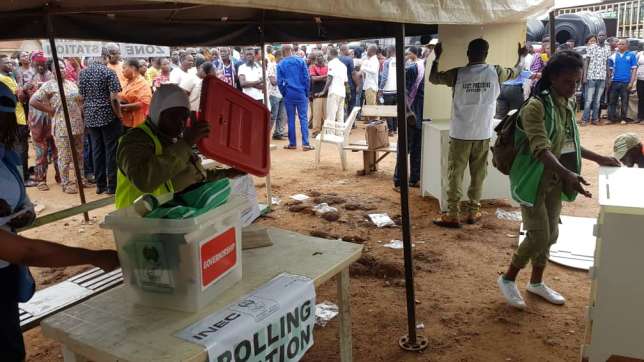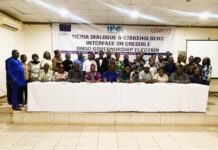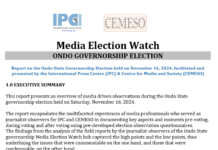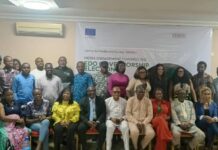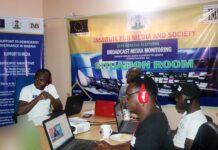The clock is ticking for the 2019 general election. But uncollected Permanent Voter Cards at the Independent National Electoral Commission’s offices nationwide, which stood at 7,458,291 as of mid-August, is a conundrum that should be resolved to avoid many Nigerians being disenfranchised.
Interestingly, there is a growing interest among Nigerians in next year’s elections. The right to vote is a civic obligation fundamental to the entrenchment of democracy in the country. To deny any prospective voter his or her right to vote because of INEC’s shoddy handling of PVC collection will not be a welcome development. A recent media report showed that Lagos State had the highest figure of 1,380,142 uncollected PVCs. Others states are: Oyo (621,437); Edo (443; 705); Osun (410,832); Ogun (408,403); Imo (370,202); Ondo (360,863); Federal Capital Territory, Abuja (256,069); Kogi (246,897); Rivers 228,911); and Ekiti (220,573). This means that more states in the South are lagging behind in the PVC procurement than those in the North.
The mess is one for which INEC is largely responsible by not decentralising the collection. If the registration was not centralised, it is farcical to now centralise the collection. It is not only PVC collection; eligible voters are also registering, just as there are requests for transfer and replacement of lost cards put at 640,706 and 998,993 respectively. This, therefore, has turned INEC offices across the country into bedlam.
Some registered voters have spent between six months and one year trying to claim their cards. Now, many leave their homes as early as 3 am without being attended to by the close of work. A 60-year-old resident of Lagos, Christy Fofah, told this newspaper of how people left their homes with mosquito nets as they prepared to sleep at INEC offices. She intoned, “People sleep at the gate where the security guards stay. Why should people leave their houses around 3 am or 4 am with insecurity problem in Nigeria because they want to get PVCs?” This is agonising and anachronistic.
As some governors have taken practical steps to mobilise voters to collect their PVCs by declaring avoidable public holidays, INEC should also embark on public enlightenment through radio, television and newspapers until this issue is sufficiently addressed. In Imo State, Governor Rochas Okorocha declared August 15 and 16 work-free for PVC collection. Markets were also shut to make it effective. Ebonyi State had earlier in April done the same thing. Traditional rulers at all levels should embrace the campaign since they are authorities with grass-roots appeal.
Above all, political parties have a crucial role to play, says the Resident Electoral Commissioner in charge of the FCT, Yahaya Bello. “It is not only the duty of INEC, but that of every stakeholder, particularly political parties, to ensure that their supporters know the importance of voting,” he said. It is during a time such as this that the National Orientation Agency should demonstrate its relevance by leading the awareness campaign.
But the allegation that some unscrupulous INEC officials are demanding between N500 and N1,000 to attend to people in record time for either registering or collecting cards in some states should be resisted by Nigerians. This is fraudulent; the scourge has been reported in Lagos, Ogun and Oyo states, among others. The INEC office in Lagos, in a statement by its spokesman, Femi Akinbiyi, attributed the illegality to touts, who lurk around their Continuous Voter Registration centres and, in fact, carry out illegal registrations.
Paying money to obtain a PVC is as criminal as a candidate for any election offering a voter money to cast his vote for him or buy his PVC. Nigerians who observe this illegality should make official report against any errant official to either INEC or law enforcement agencies. The Electoral Act 2010, in Article 130, forbids any person from giving money to anyone directly or indirectly to corruptly influence electoral behaviour after the date of an election has been announced. Anybody accused of this offence is liable on conviction to a fine of N100,000 or 12-month imprisonment or both.
Nigeria has a fast increasing population; as a result, millions of people become eligible to vote in every four-year electoral cycle. INEC, therefore, should be guided by voters’ present travails in trying to collect their PVCs or engage in CVR to leverage technology in reviewing its operations occasionally for efficient service delivery. As old as the United States democracy is, its electoral process goes through periodic innovation. For instance, the National Voter Registration Act of 1993 came to be primarily to spike voter turn-out. Its enforcement on January 1, 1995, simplified registration. To this end, states provided options in registration services via driving licence registration offices, schools, libraries and disability centres. This is the way to go.


